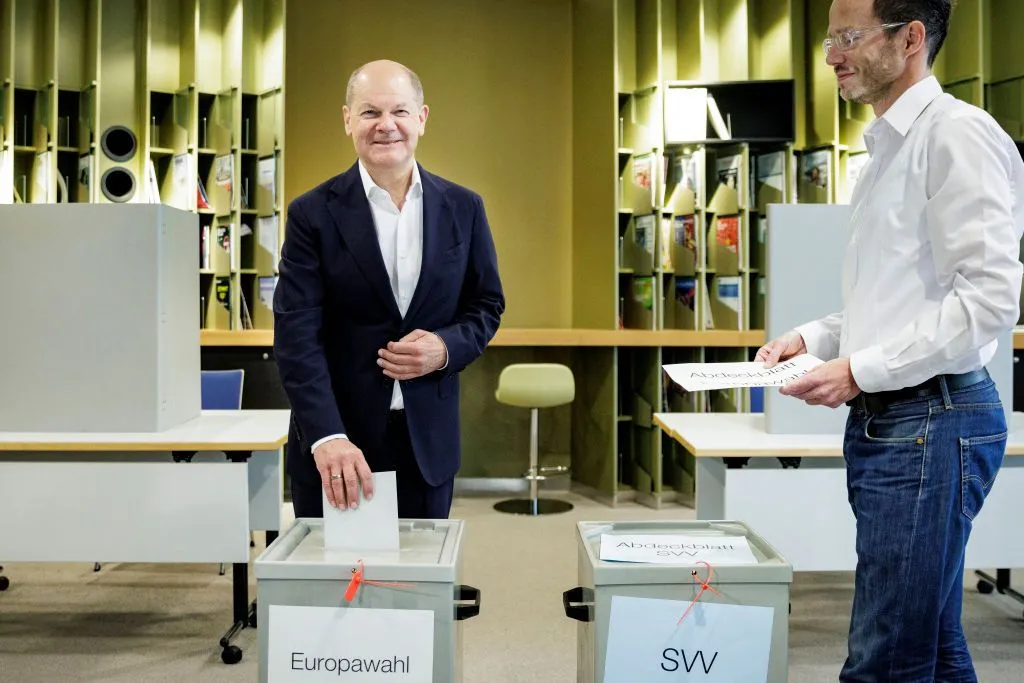
While much of the reaction to the European elections has focused on French President Emmanuel Macron’s bombshell announcement of early elections following the victory of the far-right National Rally party in France, parties in other EU countries have been considering their gains and losses. Although far-right and nationalist parties made gains, the center-right also fared well, maintaining its position as the largest group and managing to gain seats.
Center-right parties came out on top in Germany, Greece, Poland and Spain, and made significant gains in Hungary. Here are some key points from our correspondents across Europe.
Germany: coalition suffers losses, but without early elections
It was a bleak sight for Germany’s three-party coalition government, but unlike Emmanuel Macron, Chancellor Olaf Scholz said he will not call an election. The alliance between the Social Democrats, Greens and liberals was already complicated, but Russia’s invasion of Ukraine meant breaking economic and energy ties with Russia and renouncing previous pacifist sentiments. This alienated some core supporters, created partisan divisions, and overall rattled voters. A huge increase in migration has also put pressure on local council resources.
While the government has managed to increase military spending and move away from cheaper Russian energy, this means money is tight. Enter the populist far-right and the far-left, which promise a quick return to peace and prosperity: “Just negotiate with Putin and buy Russian gas again,” says the far-right Alternative for Germany (AfD). The AfD came second with 15.9% and Scholz’s social democratic SPD came third with 13.9%. The conservative CDU party came out on top with an impressive 30% of the vote.
“The majority of German voters and politicians believe that dealing with Moscow and migration is not that simple, and the majority in Germany supports Ukraine. But in times of insecurity and uncertainty, simple messages are seductive.” (Reporting by Damien McGuinness from Berlin)
Italy: PM made voting a personal issue – and it paid off
Italian Prime Minister Giorgia Meloni has consolidated her control over Italian politics. She used the European elections to boost her own popularity by putting her name at the top of her party’s ballot, and this proved to be a successful gamble: with 29%, she increased her party’s vote share in the 2022 general election. But there is another success story in Italy. The center-left opposition party, the Democratic Party (PD), performed better than expected, with 24% of the vote – its highest result since 2014.
The result will give a boost to the PD and give credibility to its leader, Elly Schlein, who has apparently managed to find her footing after just over a year at the helm of the country’s largest opposition party. Smaller parties in the ruling coalition will have food for thought. Forza Italia – the party founded by the late media mogul Silvio Berlusconi – won slightly more votes than the once-powerful and now faltering League party led by Matteo Salvini. Even the League’s founder, Umberto Bossi, declared that he would vote for Forza Italia to signal his displeasure with the direction the League has taken. Two centrist parties – one led by former Prime Minister Matteo Renzi – failed to reach the threshold necessary to send MEPs to the European Parliament. But despite these internal movements, Italy, quite unusually, emerged from the European elections as a relatively stable country – much more so, in any case, than some of its neighbors. (By Laura Gozzi from Rome)
The BBC
Source: https://www.ocafezinho.com/2024/06/10/parlamento-europeu-se-move-para-a-direita/

